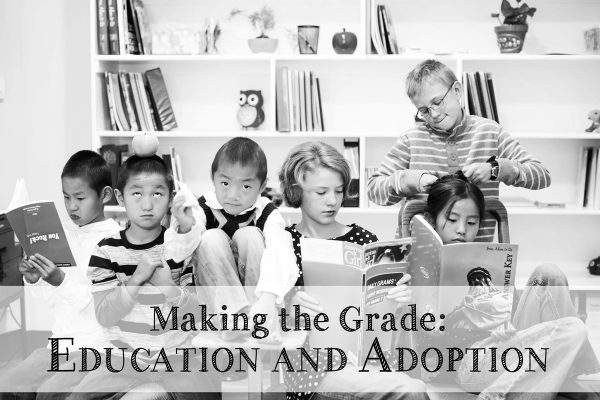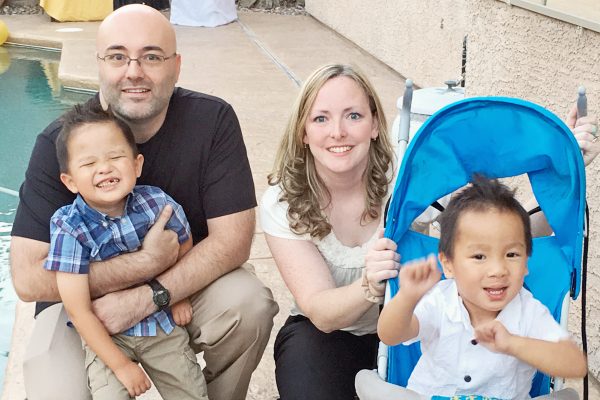
I recently had a conversation with my mom about how I felt that, as a stay at home mom, my college degree in special education was going to waste….
I have always been happy to have earned it, but it was a lot of time and money spent on something that I was no longer using. Her response? That I now use it every second of every day. This conversation not only helped me realize how valuable my degree has become, but also made me wonder how other parents navigate the world of services without one.
When my husband and I were deciding which adoption program to adopt through, the China special needs program just seemed to fit. My husband traveled to China frequently for work, and I had been teaching special needs children for over ten years.
I felt like so many of the needs on the checklist were really quite manageable, even if others didn’t consider them minor. I knew what many of them were, as I had students with those needs in my classroom during my time teaching.
We still did plenty of research when we filled out our needs checklist, but ultimately found that there were very few needs that I hadn’t previously seen with my own students. This made us all the more certain that the China special needs program was right for us.
We now have two amazing sons from China. Both boys were born with cleft lips and palates. It was the only need that was listed in their files. Luckily I had read about other families’ experiences, and knew to expect that they may have additional needs, or that having lived in an orphanage would be a special need in itself.

Our sons both receive speech and language therapy due to their clefts. They also both get occupational therapy, due to feeding and sensory concerns. Our three year old also gets physical therapy as well. He was gross motor delayed when we brought him home, and although he has come a long way, still needs therapy to help build up his core strength. I had started to get both of our sons’ therapies and service programs lined up before we traveled for them. That way, when we arrived home, services would already be in place.
Before meeting our three year old, we didn’t know how delayed he was, but we did know that he hadn’t had any surgeries for his cleft. We wanted to wait until after his lip closure and first palate procedure, to start speech and language services. We did have Parents as Teachers start within a few weeks of being home with our son.
Once his surgeries were completed, and he had time to heal, we asked our Parents as Teachers educator to refer us to the First Steps program. First Steps provided speech and language services, and physical therapy for our son. When he was close to aging out of the First Step program, we had a transition meeting and evaluation for our school district programs. He now attends preschool and receives his therapies through them at no cost to us.
Our two year old also has cleft, as stated in his file. His biggest other challenge is eating normally. He was in a very good foster facility before we brought him home, and so I guess we kind of expected that he would avoid the feeding issues that many children from orphanages face. We still have had a very long road through feeding concerns. Although we have come a long way, we definitely needed outside help with it.
Since he was at an amazing foster facility, they provided the means for him to have surgery on both his lip and palate. We didn’t feel the need to wait long to start speech services for him, since he had a functioning palate. Before we traveled to bring him home, I had set up his referral to First Steps, and for Parents as Teachers to come about two weeks after we arrived home. Due to his cleft and feeding concerns, he receives speech and language therapy and occupational therapy, through First Steps.
Since he is soon turning three, we will have his evaluation to determine what services he qualifies for through our school district. He may also qualify for the preschool with services, like our three year old. It may be that he only qualifies for outside services, where I will drive him to a school district building for an hour or two every week.

We have been able to access these services, along with several other area programs, at very little out of pocket costs to us. We also have not had to use our health insurance to access services for our boys. Although we have that option if we ever feel that they need more services than what they are getting.
In recent conversations, I have come to the realization that many families do not know that there are so many service options out there, and that many of them are free if the child qualifies.
Most areas in the US have early intervention programs. There is often more than one program that you can access and, if your child doesn’t qualify for one program, they may qualify for others. There are also auto-qualifiers – meaning that your child doesn’t need to be evaluated to receive services. This is one reason that we checked cleft lip and palate on our medical needs checklist. It is an auto-qualifier for programs in our area.
Keep in mind that services available vary from one area to the next and that states have their own laws, and programs. Many areas have similar programs, but under different names. A fairly simple web search can help you find the services in your area.
First place to start is often your school district web site. They usually will have a parent’s section, and an early childhood/early intervention (EI) section. Use this section to connect to at least one of your area’s service providers. Often times, once you are in the system for one program, they will connect you with others.
Here is some information about different programs to get you started:
1. Early Intervention
Try a search for your town or state name, and early intervention. This will usually bring up at least the first people to contact to get the ball rolling.
Early intervention typically is a program for children birth-age three. They often provide speech and language therapy, occupational therapy, physical therapy, and other therapies as needed. You can contact them, and usually refer your family to the program. There is often an evaluation before services can start. In many areas this is a free program, but in some areas there is a small fee.
2. Parents as Teachers
Try searching for your school district name or your town name and “Parents as Teachers.” This program started in Missouri, and not all states have it. It is often affiliated with or run by the school district and is a tool that the districts use to find and evaluate at-risk-kids.
It is usually a program for children birth – age three or five, it varies by area. They do not provide therapies, but they provide valuable information on how to access therapies in your area. They have programs for kids to attend and seminars for parents. Usually a parent educator will come to the house and do an activity with the child, and provide the parents with several handouts covering many different topics. Their job is to educate parents on where their children should be developmentally, and refer the child to programs and services that they may need.
3. School District Services
Try searching for your school district’s name. Most school districts have a website. If you browse the website, look for any topic that has to do with your child’s age. If you have an older child, it will also provide information on how to get your child evaluated for the services that he/she needs.
Many school districts now provide preschool services. This means that your child may enter the district programs at age three and potentially receive services through them until age twenty-one. If your child qualifies for services he/she will have an IEP. This will be a document that has information about your child’s history, and the child’s goals for the year. There will also be accommodations and modifications listed, if needed. You can often access the services that your child qualifies for through the school district, even if you choose to homeschool or send your children to private school.
4. Self/Private Pay
This does not mean that you pay entirely out of pocket. Typically insurance will cover so many sessions of certain therapy, without further approval. Call your insurance. Find out how many sessions are covered of the therapies you need. Ask about what is needed to get more sessions approved.
Often the providers that your children already see, can be the providers who also bill insurance. For example, our three year old gets OT at preschool. Let’s say the school is offering a really cool class that I think would benefit him, during one of the school breaks. If the class is OT related, I can sign him up for the it, and have the school bill my insurance to cover the cost. Also, if we go to our cleft team visit, and the speech therapist on the team isn’t happy with how our son is progressing, we can have him go to speech therapy with her, and she will bill our insurance.
In many areas there are independant businesses that provide services and classes. These are often more affordable than individual sessions of therapy. These programs are sometimes willing to bill insurance if they are able.
Keep in mind that insurance often has limits, can and will deny coverage, and it is often a battle to appeal. This can lead to an out of pocket cost to your family.
5. Regional Office
Search for the nearest big city to you, and “Regional Office”. Sometimes, it may not come up right away, you may need to add other terms to your search. Try things like Early Intervention, Special Needs, or Therapies. Many larger cities have a regional office or center. They are often affiliated with the smaller offices in smaller areas.
Regional office is like the jackpot. If there is a service you don’t know about, they will! If they don’t have the funding for it, they can direct you toward who will. They are a wealth of knowledge and full of access to grants. Almost anything you need, they can point you in the right direction.
They are a good starting point to access outside services and programs, or other programs than what your district offers.
Think of your biggest thing you would ask for, and if your child qualifies, they will find a way to get it for you! Adaptive equipment, summer camps, therapy needs, respite care, job training, the list can go on forever!
6. Variety Club and Recreation Council
These are two program that Regional Office may connect you to. They offer many activities, programs, grants/funds, seminars, etc. You do not need to go through Regional Office to access these programs.

7. Think Outside the Box
Keep in mind that almost any activity you do with your child can be a learning experience and therapy for them. Check out the programs at your library, YMCA, convention centers, preschools, malls, rec centers, community calendars etc. We frequent the free activities in our area. I signed my kids up for swimming lessons as soon as I could, and even attend with them, if needed. There are “touch the truck” events in our area frequently, where they get to see and climb on trucks, and usually there are other activities there. Home Depot and Lowes have children programs. Libraries have a ton of events. Check out your convention centers. Look for a kid expo, or kid events. Usually therapy centers, attachment therapists, schools, daycares, and service providers, will all rent a booth at these events…leading to a day of fun for the kids, and a wealth of information for you.
There is a new “gym” opening soon near my house. It is a children’s gym, that offers little classes for little ones. Yoga is my favorite on the list, so I am signing the boys up. It is great for their sensory needs, and to teach them how to calm themselves. Some of these come with a small out of pocket cost, and some of the costs can be covered by some of the programs I listed above.
8. Remember That There are Laws
Keep in mind as you move through the process to get your child services that there are laws the school district and programs must follow. If you need to, go higher up. In most states there is a website for the department of education for the state. Find the website, and contact them if you aren’t getting what you need.
Check out: Wrightslaw
If you want support in IEP meetings, or you want someone who knows the system, there are parent advocates that will go with you and help you fight for the services your child needs. They will be your voice, when you don’t know what to say or ask for.
You should get a copy of the procedural safeguards. They will give them to you at every meeting. Read through them, and use them! The district is required to do certain things and if they do not, you can seek legal council, and/or ask for due process. Most of the time the school, teachers, therapists, etc, are all on your side and want to work with you to help your child. They are bound by budgets and laws, and due to this, sometimes can’t give us everything that we want for our children. Do remember though, that if the school district can’t provide it, there are plenty of other programs that may be able to.
I now know the feeling of sitting on both sides of the table at an IEP meeting. It is daunting to try to find the services for my children, without breaking the bank. I have only been able to navigate my way through because of my background in education. I can’t imagine how so many of you on this journey, find and obtain the services that your children need. My hope is that this will help those of you who are struggling to find what you need.
Please feel free to find me on Facebook, and message me with questions you have. If you can’t find the programs in your area, I can try to help.
– guest post by Jaime

























Excellent! Thank you for sharing 🙂